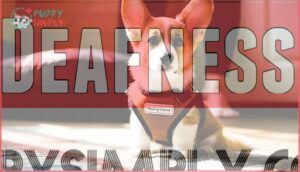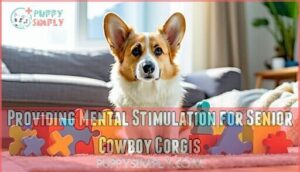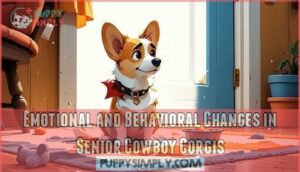This site is supported by our readers. We may earn a commission, at no cost to you, if you purchase through links.

This impressive longevity stems from their robust herding dog genetics and hybrid vigor from combining Pembroke Welsh Corgi and Australian Cattle Dog bloodlines.
You’ll find their lifespan mirrors their parent breeds, but genetics, diet, exercise, and preventive veterinary care determine whether your pup reaches the upper end of this range.
Common health challenges include hip dysplasia and progressive retinal atrophy, but proper screening and care can substantially impact their quality of life.
With the right approach, many cowboy corgis maintain their characteristic enthusiasm well into their senior years, and there are specific strategies that can help maximize those precious years together.
Table Of Contents
- Key Takeaways
- Cowboy Corgi Lifespan
- Factors Affecting Cowboy Corgi Lifespan
- Common Health Issues in Cowboy Corgis
- Tips for Increasing Cowboy Corgi Lifespan
- Signs of Aging in Cowboy Corgis
- Lifestyle Adjustments for Senior Cowboy Corgis
- Providing Mental Stimulation for Senior Cowboy Corgis
- Creating a Safe Environment for Senior Cowboy Corgis
- Emotional and Behavioral Changes in Senior Cowboy Corgis
- Quality of Life Considerations for Senior Cowboy Corgis
- Frequently Asked Questions (FAQs)
- How long do cowboy Corgis live?
- How long do corgi dogs live?
- How long do Corgis last?
- How big do cowboy Corgis get?
- How long do Pembroke Welsh Corgis live?
- Are cowboy corgi dogs prone to health problems?
- Do cowboy Corgis have health issues?
- What two breeds make up a cowboy Corgi?
- Do Cowboy Corgis live longer than parent breeds?
- When do Cowboy Corgis reach senior age status?
- Conclusion
Key Takeaways
- Your cowboy corgi’s lifespan typically ranges from 12-16 years, making them longer-lived than many designer breeds due to their robust herding genetics and hybrid vigor from combining Welsh Corgi and Australian Cattle Dog bloodlines.
- You’ll need to watch for inherited health issues like hip dysplasia, intervertebral disc disease, and progressive retinal atrophy that can significantly impact their quality of life, but proper screening and preventive care can help manage these conditions effectively.
- Regular veterinary checkups, balanced nutrition, and appropriate exercise directly influence longevity – maintaining ideal weight, providing joint-friendly activities, and scheduling biannual vet visits can help your dog reach the upper end of their lifespan range.
- Creating a senior-friendly environment becomes crucial as your cowboy corgi ages – you’ll need to provide orthopedic bedding, non-slip surfaces, accessible food bowls, and gentle exercise routines to maintain their comfort and mobility during their golden years.
Cowboy Corgi Lifespan
Your Cowboy Corgi’s lifespan typically ranges from 12-15 years with proper care.
This corgi lifespan expectancy depends on several longevity factors including genetics, diet plans, and exercise needs.
The lifespan of a cowboy corgi matches the corgi average lifespan, making them excellent long-term companions.
Genetic testing can identify potential health risks early, while consistent grooming tips help maintain their overall well-being.
Regular veterinary checkups and customized exercise routines substantially impact your dog’s quality of life and longevity throughout their golden years.
Factors Affecting Cowboy Corgi Lifespan
Your Cowboy Corgi’s lifespan depends on several key factors that you can influence through proper care and attention.
Understanding these elements helps you make informed decisions that can extend your dog’s healthy years and improve their overall quality of life, which is crucial for their well-being and your quality of life together.
Health and Genetics
Understanding your Cowboy Corgi’s genetic blueprint can reveal the secret to a longer, healthier life.
These hybrid dogs inherit traits from both parent breeds, creating unique health screening needs that smart owners shouldn’t ignore.
Genetic testing reveals breed predispositions before symptoms appear.
DNA research shows Cowboy Corgis face inherited traits like intervertebral disc disease (IVDD) and degenerative myelopathy from their Corgi lineage, plus hip dysplasia from their Australian Cattle Dog heritage.
This knowledge isn’t just academic—it’s your roadmap to prevention.
Health screening catches problems early when they’re most treatable.
Progressive retinal atrophy and deafness can develop silently, but genetic testing identifies carriers before breeding.
The cowboy corgi lifespan averages 12-15 years, but understanding corgi health issues through proper screening can extend those golden years.
Corgi lifespan expectancy improves dramatically when you address genetic risks proactively.
Think of genetic testing as your dog’s crystal ball—revealing tomorrow’s challenges today.
Diet and Exercise
Maintaining ideal nutrition plans and exercise routines substantially extends your cowboy corgi lifespan.
Balance calorie intake with your dog’s fitness levels through structured dog diet plans and consistent dog exercise routines.
Incorporate healthy snacks sparingly while monitoring weight.
Daily walks, herding activities, and mental stimulation meet corgi exercise needs.
Following expert corgi nutrition advice prevents obesity-related health issues that commonly shorten lifespan in this energetic breed.
Veterinary Care
Regular veterinary care serves as your Cowboy Corgi’s lifeline to longevity. Establishing consistent vaccine schedules protects against preventable diseases that can substantially impact your corgi’s health and lifespan.
Your vet will recommend age-appropriate immunizations and create a customized prevention plan. Consider investing in pet insurance early—it’s like having a safety net when medical emergencies strike.
These energetic dogs can face unexpected health challenges, and coverage helps you make decisions based on your pet’s needs rather than your wallet. Diagnostic tests catch corgi health issues before they become serious problems.
Annual blood work, hip evaluations, and eye exams are smart investments in your dog’s future. When surgical options become necessary, having an established relationship with your veterinarian guarantees better outcomes.
Preventive health measures combined with regular veterinary care create the foundation for extending your Cowboy Corgi’s lifespan naturally.
Common Health Issues in Cowboy Corgis
While Cowboy Corgis are generally healthy dogs, they can inherit certain health conditions from their parent breeds that may affect their quality of life and longevity.
Understanding these common health issues will help you recognize early warning signs and take proactive steps to keep your furry companion healthy throughout their 12-15 year lifespan, ensuring you can provide the best care for your furry companion.
Hip Dysplasia
Hip dysplasia affects approximately 15.56% of dogs, with hybrid breeds like your Cowboy Corgi showing higher rates at 21.5%. This genetic condition causes abnormal hip socket formation, leading to pain and potential arthritis that can substantially impact your corgi health and cowboy corgi lifespan.
You’ll notice early warning signs that shouldn’t be ignored:
- Difficulty rising from lying positions or climbing stairs
- Bunny hopping gait during running or play
- Stiffness and limping after exercise or rest
- Reluctance to jump or participate in activities
- Muscle loss around the hip area
Early intervention through pet orthopedics makes a real difference. Weight management prevents additional joint stress, while low-impact exercise maintains mobility without damage. Your vet might recommend joint care supplements, physical therapy, or in severe cases, hip replacement surgery.
Don’t let this common corgi health issue steal precious years from your companion’s life. Understanding hip dysplasia causes is vital for effective management and treatment.
Intervertebral Disc Disease
Your cowboy corgi’s spine carries the weight of their active lifestyle, but Intervertebral Disc Disease IVDD can turn their world upside down.
This degenerative condition affects the cushioning discs between vertebrae, causing disc herniation and severe back problems that directly impact your corgi lifespan.
IVDD develops when spinal discs degenerate or rupture, putting pressure on the spinal cord. Your cowboy corgi’s long back and short legs make them particularly vulnerable to this spine health issue, which can progress from mild discomfort to complete paralysis.
| IVDD Stage | Symptoms | Treatment |
|---|---|---|
| Grade 1 | Neck/back pain, reluctance to move | Rest, anti-inflammatory medications |
| Grade 2 | Wobbly gait, weakness | Strict crate rest, pain management |
| Grade 3 | Partial paralysis, dragging limbs | Surgery consideration, physical therapy |
| Grade 4 | Complete paralysis, no bladder control | Emergency surgery required |
| Grade 5 | Loss of deep pain sensation | Immediate surgical intervention |
Early detection through regular vet checkups gives your dog the best chance at maintaining quality of life.
Proper spinal care, including weight management and avoiding high-impact activities, helps prevent this devastating condition from shortening your cowboy corgi lifespan.
Progressive Retinal Atrophy
Progressive Retinal Atrophy strikes silently, gradually stealing your cowboy corgi’s vision through retinal degeneration.
This inherited condition affects both parent breeds, making genetic testing essential for understanding your dog’s risk.
Early eye care and regular veterinary screenings can catch vision loss before it progresses to complete blindness causes.
While there’s no cure, understanding this canine health challenge helps you adapt your home environment, making simple changes like consistent furniture placement and verbal cues to maintain your dog’s quality of life.
Remember, many dogs with Progressive Retinal Atrophy live full, happy lives despite their visual limitations, proving that this condition doesn’t have to shorten your corgi health tips or overall dog lifespan factors, and with proper care, they can thrive in their environment with minimal visual limitations.
Deafness
Deafness affects some Cowboy Corgis due to deaf genetics inherited from their parent breeds.
This hearing loss can be congenital or develop from chronic ear infections.
Watch for signs like not responding to sounds, excessive barking, or startling when touched unexpectedly.
Early detection through auditory care screenings helps manage this condition effectively.
If your pup develops hearing loss, don’t worry—these resilient dogs adapt remarkably well.
Train using hand signals and visual cues instead of verbal commands.
Sound therapy and vibrating collars can also enhance communication.
Deaf-friendly activities like scent work and agility training provide excellent mental stimulation without relying on hearing.
These corgi breed characteristics don’t necessarily shorten your cowboy corgi lifespan.
With proper canine health management and corgi health tips, deaf Cowboy Corgis live full, happy lives alongside their hearing counterparts.
Tips for Increasing Cowboy Corgi Lifespan
You can substantially extend your Cowboy Corgi’s lifespan by implementing proven health management strategies that address their unique genetic predispositions and physical needs.
The following evidence-based approaches focus on preventive care, proper nutrition, and lifestyle modifications that directly impact longevity and quality of life.
Regular Veterinary Check-ups
Regular check-ups with your veterinarian form the backbone of your cowboy corgi lifespan management strategy. These vet visits aren’t just annual formalities—they’re your dog’s health insurance policy in action.
During these appointments, your vet will conduct thorough health screenings that can catch problems before they become expensive emergencies. Most veterinarians recommend biannual visits for adult dogs, with vaccine schedules adapted to your pet’s lifestyle.
Keep detailed medical records of all treatments, test results, and medications. This documentation becomes invaluable when tracking health trends over time.
Think of regular veterinary care as preventive maintenance for your car—skipping oil changes leads to engine trouble. Your vet can spot early signs of hip dysplasia, heart conditions, or other issues that commonly affect this energetic breed, giving you more dog health tips to extend their lifespan.
Balanced Diet and Proper Nutrition
Providing ideal nutrition forms the foundation of your Cowboy Corgi’s longevity and wellness.
You’ll need to balance their unique dietary requirements, considering their hybrid genetics from both Welsh Corgis and Australian Cattle Dogs.
Focus on these three essential nutrition strategies:
- Nutrient Balance – Choose high-quality proteins and controlled portions to prevent obesity
- Food Allergies – Monitor for sensitivities common in both parent breeds
- Meal Planning – Establish consistent feeding schedules with measured portions
Dietary supplements may support joint health, while healthy snacks like carrots provide mental stimulation without excess calories.
Regular Exercise and Mental Stimulation
While proper nutrition sets the foundation for longevity, physical activity and cognitive challenges work together to maximize your cowboy corgi lifespan.
These energetic dogs require consistent exercise routines and mental games to prevent behavioral issues and maintain peak health. Regular exercise supports cardiovascular function, joint mobility, and weight management, while mental stimulation prevents cognitive decline and reduces stress-related behaviors.
Investing in proper dog exercise equipment, such as dog fitness tools, is essential for their development.
| Age Group | Exercise Routines | Mental Games |
|---|---|---|
| Puppy (8-12 months) | Short walks, supervised playtime activities | Basic training, puzzle toys |
| Adult (1-7 years) | Daily walks, fetch, agility training | Advanced tricks, interactive feeders |
| Senior (8+ years) | Gentle walks, swimming, light play | Memory games, sniffing exercises |
Social interactions with other dogs enhance their herding instincts positively. Stimulation techniques like hide-and-seek or treasure hunts tap into their natural intelligence.
Varying activities prevents boredom and maintains their enthusiasm for exercise and activity level throughout their lives.
Dental Care
Good dental hygiene practices can prevent tooth decay and gum disease while extending your Cowboy Corgi’s life. Poor oral health doesn’t just cause bad breath—it can lead to serious systemic infections that affect the heart, liver, and kidneys.
Brush your dog’s teeth three times weekly using canine-specific toothpaste and a soft-bristled brush. Never use human toothpaste, as it contains xylitol, which is toxic to dogs. Start slowly by letting your pup sniff and lick the brush, then gradually introduce gentle brushing motions.
Provide dental chews and rope toys to naturally scrape away plaque buildup. Look for products approved by the Veterinary Oral Health Council. Schedule professional cleanings annually, as your vet can detect early signs of periodontal disease and remove tartar below the gum line. Consistent dog dental hygiene prevents painful extractions and costly treatments later.
Preventive Measures for Common Health Issues
Prevention becomes your strongest ally in extending your Cowboy Corgi’s lifespan and maintaining their quality of life.
Start with responsible breeding practices by choosing breeders who conduct OFA or PennHIP certifications, which substantially reduce genetic risks like hip dysplasia.
Maintain ideal body weight through proper nutrition tips and customized exercise plans—excess weight doubles the risk of joint problems and spinal issues.
Schedule regular vet visits for thorough health checks, including eye exams for progressive retinal atrophy and spinal assessments for intervertebral disc disease.
Implement disease prevention strategies like using harnesses instead of collars to protect the spine, providing ramps for furniture access, and avoiding high-impact activities during growth phases.
These preventive measures directly impact dog longevity and cowboy corgi lifespan expectations. Regular checks for retinal health issues can help identify potential problems early on.
Signs of Aging in Cowboy Corgis
As your Cowboy Corgi enters their senior years, you’ll notice subtle changes that signal the natural aging process.
Recognizing these early signs helps you provide better care and maintain your dog’s quality of life during their golden years.
Decreased Energy Levels
As your Cowboy Corgi enters into their senior years, you’ll notice Energy Decline becoming more apparent in their daily routine.
What once seemed like an endless reservoir of enthusiasm gradually diminishes, with your furry companion showing clear signs of Senior Lethargy and reduced interest in activities they previously loved.
This natural aging process manifests as Low Activity periods where your dog prefers comfortable resting spots over vigorous play sessions.
Fatigue Causes in senior dogs include decreased muscle mass, joint discomfort, and metabolic changes that affect their overall stamina.
You might observe Weakness Signs such as reluctance to climb stairs, shorter walks, or taking frequent breaks during exercise.
These decreased energy levels are normal indicators that your Cowboy Corgi’s body is adapting to the aging process, requiring adjustments to their care routine to maintain superior dog longevity and quality of life throughout their golden years.
Joint Stiffness and Mobility Issues
As your Cowboy Corgi ages, you’ll notice subtle changes in their movement that signal developing joint health concerns.
Joint stiffness becomes apparent when your dog hesitates before jumping onto furniture or moves more slowly during morning walks. Watch for reluctance to climb stairs, difficulty rising from lying positions, or shortened exercise sessions.
These mobility issues often stem from arthritis management needs or natural wear on cartilage. Dog joint care becomes essential at this stage.
Flexibility exercises like gentle swimming or controlled leash walks help maintain range of motion. Dog mobility issues can be addressed with ramps, orthopedic beds, and non-slip surfaces.
Dog arthritis responds well to veterinary-prescribed anti-inflammatory medications. Dog joint pain shouldn’t limit your companion’s quality of life when proper stiffness causes are identified and treated with appropriate mobility aids.
Changes in Appetite and Weight
As aging progresses, your Cowboy Corgi’s food intake and weight gain patterns often shift dramatically.
You’ll notice appetite loss becoming more common, while others develop increased cravings that lead to unwanted pounds.
These changes in feeding habits signal that your dog’s nutrition needs are evolving with age. Senior dogs require fewer calories but higher-quality nutrients to maintain healthy health throughout their dog lifespan.
Effective weight management becomes essential since excess weight accelerates joint deterioration and shortens life expectancy. Monitor portion sizes carefully and adjust meal frequency if dog appetite loss occurs.
Dog weight gain happens easily when metabolism slows, so regular weigh-ins help catch problems early. Dog obesity prevention requires vigilant attention to treats and table scraps that add unnecessary calories.
Dental Problems
When do dental problems become a serious concern for aging Cowboy Corgis? These issues typically emerge around seven to eight years old, making early detection essential for maintaining your dog’s overall health and quality of life.
Senior Cowboy Corgis face several oral health challenges that can substantially impact their well-being. Tooth decay and gum disease often develop gradually, while bad breath serves as an early warning sign that shouldn’t be ignored. Without proper dog dental care, these conditions can progress to tooth loss and painful oral infections that affect eating and overall comfort.
Key dental warning signs include:
- Persistent bad breath that doesn’t improve with brushing
- Yellow or brown tartar buildup along the gum line
- Red, swollen, or bleeding gums during eating
- Difficulty chewing or pawing at the mouth
Regular brushing with enzymatic toothpaste and professional cleanings help prevent these issues. Dog disease prevention through consistent oral hygiene directly impacts dog lifespan factors, as dental infections can spread to organs if left untreated.
Lifestyle Adjustments for Senior Cowboy Corgis
As your Cowboy Corgi enters their golden years, adapting their daily routine becomes essential for maintaining comfort and quality of life.
Simple modifications to their environment, exercise regimen, and healthcare can substantially improve their mobility and overall well-being during this important life stage.
Comfortable Sleeping Areas
As your senior Cowboy Corgi ages, you’ll need to transform their sleeping space into a therapeutic sanctuary that supports aging joints and muscles.
Supportive dog beds with memory foam or orthopedic features become essential bedding options, providing the joint cushioning that standard dog bedding can’t match. Create cozy nooks in quiet areas of your home where your pup can retreat without disturbance from household activity.
Consider mattress choices that offer temperature regulation and pressure relief, while nonslip carpets around rest areas prevent dangerous slips during nighttime movements. The sleep environment should include easy-access water bowls and adequate lighting for safe navigation.
Dog comfort isn’t just about luxury—it’s about maintaining quality of life as mobility decreases. Think of it like upgrading from a camping cot to a luxury hotel bed; the difference becomes more important with age.
Position multiple rest areas throughout your home so your senior dog doesn’t have to travel far for dog physical stimulation recovery time. This approach ensures your dog’s comfort and supports their overall well-being, making it a crucial aspect of their aging care.
Gentle Exercise and Joint Support
During periods of decreased mobility, low impact activities like swimming and gentle stretches become your Cowboy Corgi’s best friends.
Daily walks on soft surfaces help maintain cardiovascular health while protecting aging joints from unnecessary strain.
Consider introducing canine yoga movements and glucosamine supplements to support joint care naturally.
Dog joint health supplements containing omega-3 fatty acids can substantially improve your pet’s comfort levels.
When dog arthritis symptoms appear, focus on maintaining dog mobility through consistent, gentle exercise routines rather than high-intensity activities that stress vulnerable joints.
Regular use of joint health supplements can help alleviate arthritis symptoms and improve overall joint function.
Regular Vet Visits and Medications
Regular checkups become your lifeline for extending your cowboy corgi lifespan as they age.
Schedule vet visits every six months to catch health issues early through thorough dog health screenings and blood work.
Your veterinarian will adjust vaccination schedules, monitor prescription medications, and track chronic conditions like arthritis or heart disease.
Consistent prescription monitoring guarantees medications remain effective while preventing dangerous drug interactions.
This proactive veterinary care approach substantially impacts your dog’s quality of life and longevity.
Nutritional Supplements
Beyond basic nutrition, strategic supplementation can substantially enhance your senior Cowboy Corgi’s quality of life.
Vitamin Needs increase with age, particularly B-complex vitamins for cognitive function and energy metabolism. Mineral Boost supplements containing calcium and phosphorus support bone density, while Probiotic Benefits include improved digestive health and immune system strengthening.
Omega Supplements, especially fish oil supplements, reduce inflammation and support joint mobility. Antioxidant Support from vitamins C and E combats cellular damage associated with aging.
Glucosamine and chondroitin combinations target joint health specifically. Quality dog nutrition brands now offer senior-specific formulations with antioxidant-rich foods integrated.
Always consult your veterinarian before introducing new dog supplements, as proper dosing prevents adverse interactions with existing medications and guarantees maximal absorption rates.
Providing Mental Stimulation for Senior Cowboy Corgis
As your senior Cowboy Corgi ages, maintaining mental stimulation becomes essential for preserving cognitive function and preventing behavioral decline.
You’ll need to adapt enrichment activities to match your dog’s changing physical abilities while still challenging their intelligent, herding-bred mind, which is crucial for their overall well-being and requires mental stimulation.
Puzzle Toys and Treat Dispensers
Mental stimulation through puzzle toys and treat dispensers keeps your senior Cowboy Corgi’s mind sharp and prevents cognitive decline. These interactive games challenge problem-solving skills while providing rewarding entertainment.
A puzzle feeder slows eating habits and engages natural foraging instincts. Dog puzzles like treat-dispensing balls encourage movement and mental focus.
Quality puzzle toys directly impact dog lifespan extension by maintaining cognitive function. Regular mental stimulation improves your dog’s quality of life substantially during their golden years.
A balanced diet with proper corgi homemade dog food can also support overall health and cognitive function in senior Cowboy Corgis, which is crucial for a healthy and happy life, and provides rewarding entertainment and improves problem-solving skills.
Interactive Play and Training Games
Your cowboy corgi’s cognitive health depends on consistent mental challenges that keep their sharp herding instincts engaged.
Interactive play and training games provide essential neurological stimulation while strengthening your bond during their golden years.
Consider these proven mental stimulation techniques:
- Agility Training – Set up low hurdles and weave poles for gentle physical coordination
- Trick Learning – Teach new commands like "spin" or "bow" using positive reinforcement
- Dog Sports – Try Rally Obedience or scent work competitions designed for seniors
- Mental Games – Hide treats around the house for structured search-and-find activities
These activities support dog lifespan extension by maintaining cognitive function and preventing mental decline.
Daily Walks and New Environments
Daily walks in new environments offer unparalleled environmental enrichment for senior Cowboy Corgis.
Fresh scenery stimulates their cognitive abilities while maintaining physical fitness essential for cowboy corgi lifespan. Your walk routine should incorporate varied locations—neighborhood parks, quiet trails, or downtown sidewalks—to maximize exploration benefits.
| Environment Type | Mental Benefits | Safety Considerations |
|---|---|---|
| Parks | New scents, social interaction | Leash control, other dogs |
| Trails | Natural stimulation, terrain variety | Uneven surfaces, wildlife |
| Urban Areas | Sounds, sights, people | Traffic awareness, crowds |
Socialization tips include gradual introductions to unfamiliar settings. Your dog’s comfort level determines pace—some seniors adapt quickly while others need encouragement.
Outdoor safety remains paramount; check paws for cuts and monitor breathing during exercise. Regular grooming after outdoor adventures prevents debris buildup.
These dog longevity tips guarantee mental sharpness while supporting overall well-being through structured, enjoyable experiences.
Creating a Safe Environment for Senior Cowboy Corgis
As your Cowboy Corgi enters their golden years, creating a safe home environment becomes essential for preventing injuries and maintaining their quality of life.
Simple modifications around your house can make a significant difference in keeping your senior companion comfortable and secure as they navigate age-related mobility challenges.
Removing Hazards and Trip Hazards
Safety transforms your home into a sanctuary for your aging Cowboy Corgi. Senior dogs face increased fall risks due to diminished vision and joint stiffness, making clutter removal and home modifications essential for fall prevention.
- Secure flooring with non-slip mats or carpet tiles to prevent slipping
- Remove dog tripping hazards like loose rugs, electrical cords, and toys from walkways
- Create safe zones by relocating low furniture and coffee tables away from traffic areas
- Install dog safety barriers at stairs and elevated areas to prevent accidental falls
These senior dog care adjustments reduce injury risks while maintaining your pet’s independence and confidence. Using non slip mats can substantially enhance home safety for senior dogs.
Providing Adequate Lighting
Adequate lighting becomes increasingly important as your cowboy corgi ages and their vision naturally declines.
Poor lighting contributes to accidents, falls, and anxiety in senior dogs who struggle to navigate familiar spaces.
Strategic lamp placement throughout your home creates safe pathways for nighttime movement. LED options offer energy-efficient solutions that last longer than traditional bulbs.
Choose warm color temperature (2700K-3000K) to avoid harsh glare that can worsen vision problems.
Natural light during daytime hours supports your dog’s circadian rhythm and overall dog wellness. Smart lighting design includes motion-activated fixtures near stairs and hallways where your cowboy corgi frequently travels.
| Lighting Solution | Benefits for Senior Dogs |
|---|---|
| Motion-sensor lights | Automatic activation prevents startling |
| Dimmer switches | Adjustable brightness reduces eye strain |
| LED strip lights | Gentle pathway illumination |
| Natural sunlight | Supports canine genetics and mood |
This thoughtful approach to illumination directly impacts your dog’s lifespan by preventing injury-related complications that commonly affect aging dog health.
Non-slip Surfaces
When your cowboy corgi reaches their golden years, prioritizing safe flooring becomes essential for preventing dangerous falls.
Installing non-slip surfaces throughout your home protects aging joints and maintains your senior dog’s mobility and confidence.
Here are four key non-slip solutions to enhance your cowboy corgi’s safety:
- Floor Grip Mats – Place textured mats in high-traffic areas like hallways and near food bowls to provide immediate surface textures that prevent slipping.
- Non Slip Coatings – Apply specialized coatings to smooth surfaces like tile or hardwood floors, creating invisible slip resistance without changing your home’s appearance.
- Safe Flooring Strips – Install adhesive strips on stairs and ramps to give your senior cowboy corgi reliable traction during daily movement.
- Textured Rugs – Choose rugs with rubber backing and surface textures that grip paws naturally, supporting dog health and senior care needs.
Considering outdoor dog care tips is also vital for their overall well-being.
Accessible Food and Water Bowls
As your cowboy corgi ages, positioning food and water bowls correctly becomes more important for their comfort and health. Elevated bowls reduce neck strain and make eating easier for senior dogs experiencing joint stiffness or mobility issues.
Choose feeding stations that match your dog’s shoulder height – typically 4-6 inches for most corgis. Bowl sizes should accommodate their portions without being too deep, as shallow dishes work best for their shorter snouts.
Water height adjustments help maintain proper hydration without forcing awkward positioning. Food placement near their favorite resting spots encourages regular eating habits.
Consider non-slip bases to prevent bowls from sliding across floors. These simple adjustments support your aging companion’s digestive health and overall comfort.
Proper canine care includes these practical dog health modifications that can substantially impact your corgi’s quality of life and potentially extend their lifespan through better nutrition access.
Emotional and Behavioral Changes in Senior Cowboy Corgis
As your Cowboy Corgi enters their senior years, you’ll notice distinct changes in their emotional and behavioral patterns that require understanding and patience.
These shifts often include increased separation anxiety, changes in vocalization habits, altered sleep cycles, and potential cognitive decline that can affect their daily routines and interactions with family members, leading to a need for patience and adapted care.
Separation Anxiety
Senior dogs often face anxiety triggers that weren’t present in their younger years.
Your cowboy corgi may develop separation anxiety as cognitive changes affect their mental stability.
This separation stress manifests through excessive barking, destructive behavior, or house accidents when you’re away.
Dog calming techniques like gradual departures and consistent routines help manage these episodes.
Anxiety prevention starts with recognizing early warning signs and maintaining familiar environments.
Canine comfort items, interactive toys, and pheromone diffusers provide emotional support during your absence, promoting better dog mental health and effective anxiety management.
Understanding the complete guide to dog separation anxiety is essential for addressing these issues in senior dogs, as it involves recognizing separation anxiety signs.
Increased Vocalization
As your Cowboy Corgi enters their golden years, you’ll likely notice increased vocalization becoming more prominent.
Senior dogs often develop new barking patterns and whining causes that weren’t present in their younger years. Excessive barking may stem from cognitive changes, hearing loss, or anxiety-related vocalization triggers.
Your aging companion might howl or bark more frequently due to confusion, discomfort, or heightened sensitivity to environmental changes. Understanding these howling reasons helps you respond appropriately.
The corgi lifespan typically spans 12-15 years, and vocalization changes are normal during this period. Monitor these behavioral shifts closely, as they can indicate underlying health issues affecting your cowboy corgi lifespan.
Changes in Sleep Patterns
Your aging Cowboy Corgi’s sleep cycle will likely shift as they enter their senior years. You’ll notice more daytime napping and increased nighttime restlessness, which disrupts their natural rest modes.
These changes in sleep patterns are normal aging signs that affect cowboy corgi lifespan quality. Senior dogs often experience altered dream patterns and wakefulness cycles due to physical discomfort or cognitive changes.
Creating consistent nighttime habits helps maintain better sleep quality. Provide orthopedic bedding in quiet areas and establish regular bedtime routines. Monitor their sleep behavior for excessive changes, as dramatic shifts may indicate underlying health issues.
Dog aging affects sleep architecture, making restorative sleep more challenging. Senior care includes adjusting their environment with comfortable temperatures and minimizing disturbances. Understanding these dog lifespan statistics helps you support your companion’s changing needs during their golden years.
Cognitive Decline
Beyond sleep pattern changes lies another challenge that can substantially impact your Cowboy Corgi’s golden years. Brain aging naturally occurs as your dog reaches senior status, potentially affecting their memory loss and overall canine cognitive health.
You’ll notice signs like confusion, disorientation, or forgetting familiar routines – these dementia signs shouldn’t be ignored.
Watch for these cognitive decline indicators:
- Difficulty recognizing familiar faces or places
- Increased anxiety or restlessness at night
- Forgetting house training habits
- Reduced response to their name or commands
- Staring blankly at walls or corners
Senior care focused on maintaining mental sharpness can slow progression, though conditions like degenerative myelopathy may compound these issues. Regular dog mental wellbeing activities help preserve cognitive function throughout your cowboy corgi lifespan.
Quality of Life Considerations for Senior Cowboy Corgis
As your Cowboy Corgi enters their golden years, you’ll need to make thoughtful decisions about their comfort and well-being.
This stage requires careful attention to pain management, emotional needs, and potentially difficult end-of-life choices.
Palliative Care and Pain Management
When your senior Cowboy Corgi faces chronic pain or terminal illness, palliative care becomes your lifeline for maintaining their dignity and comfort.
You’ll need to work closely with your veterinarian to develop a thorough pain management plan that combines traditional medications with comfort therapy approaches.
Regular pain assessments using validated tools help you monitor your dog’s response to treatment and adjust accordingly.
Hospice care principles focus on symptom management rather than cure, emphasizing quality over quantity of life.
Consider incorporating physical therapy, massage, and environmental modifications like orthopedic bedding to support your canine companion.
End-of-life decisions require honest conversations about your pet’s comfort levels and overall well-being.
Emotional Support and Companionship
The emotional bonds you share with your cowboy corgi remain one of life’s greatest treasures, even as they age.
Your loyal companion continues providing emotional support through their gentle presence and unwavering devotion.
Companion animals like your corgi offer profound therapeutic benefits, reducing stress and anxiety while boosting your overall well-being.
Animal assisted interactions with your aging pet create meaningful moments that strengthen your connection.
Studies show canine therapy effects extend beyond physical health, improving mental resilience during challenging times.
Your corgi’s protective instincts and loving nature provide comfort when you need it most.
Though pet grief may feel overwhelming as you witness changes, remember that maintaining companionship enriches both your lives.
The corgi lifespan includes these precious golden years where your bond deepens through shared experiences and mutual care, fostering a deeper sense of emotional support.
End-of-Life Decision Making
When your Cowboy Corgi faces terminal illness, making end-of-life decisions becomes one of your most challenging responsibilities.
These choices require careful consideration of your dog’s quality of life, especially with conditions like degenerative myelopathy or severe intervertebral disc disease affecting their daily comfort.
Consider these essential factors:
- Euthanasia Options – Discuss timing and procedures with your veterinarian
- Palliative Care – Explore pain management and comfort measures
- Hospice Support – Investigate at-home care services for terminal conditions
- Pet Loss preparation – Plan for final moments and aftercare arrangements
- Grief Counseling – Identify support resources for your family’s healing process
This corgi lifespan milestone demands compassionate end-of-life decision making with professional guidance.
Frequently Asked Questions (FAQs)
How long do cowboy Corgis live?
Your beloved Cowboy Corgi typically lives 12-15 years with proper care, genetics, and lifestyle management. Regular veterinary checkups, balanced nutrition, and adequate exercise help maximize their lifespan potential.
How long do corgi dogs live?
Time flies when you’re having fun, and Corgi dogs typically live 12-13 years with proper care.
You’ll find both Pembroke Welsh and Cardigan Welsh Corgis share similar lifespans, considered good for purebred dogs.
How long do Corgis last?
Corgis typically live 12-15 years with proper care, diet, and exercise. You’ll find both Pembroke Welsh and Cardigan Welsh Corgis share similar lifespans, which is considered excellent for purebred dogs.
How big do cowboy Corgis get?
Like pocket-sized powerhouses, full-grown Cowboy Corgis typically weigh 25-30 pounds and stand 12-14 inches tall.
While mini versions reach 20-25 pounds at 10-12 inches—compact enough for most living spaces yet sturdy for active lifestyles.
How long do Pembroke Welsh Corgis live?
Your Pembroke Welsh Corgi will typically live 12-13 years, though some reach 15 years or more with proper care.
Their lifespan depends on genetics, diet, exercise, and regular veterinary checkups throughout their life.
Are cowboy corgi dogs prone to health problems?
Yes, cowboy corgis inherit several health issues from their parent breeds, including hip dysplasia, intervertebral disc disease, progressive retinal atrophy, and potential deafness that you’ll need to monitor carefully.
Do cowboy Corgis have health issues?
Your furry friend faces several health challenges you’ll want to monitor closely. Hip dysplasia, spinal disc disease, eye problems, and joint issues commonly affect this energetic breed throughout their lives.
What two breeds make up a cowboy Corgi?
Clever canine combinations create charming companions when you’re exploring hybrid breeds.
A Cowboy Corgi’s a cross between a Pembroke Welsh Corgi and an Australian Cattle Dog, blending herding instincts with compact size for active families.
Do Cowboy Corgis live longer than parent breeds?
Cowboy Corgis typically live 12-15 years, matching their parent breeds’ lifespans rather than exceeding them.
You’ll find their longevity depends on genetics, diet, exercise, and preventive veterinary care from both Australian Cattle Dog and Pembroke Welsh Corgi lineages.
When do Cowboy Corgis reach senior age status?
Your Cowboy Corgi typically reaches senior status around 7-8 years old, though individual dogs may vary based on genetics and overall health.
This timeline helps you prepare for age-related care adjustments, which is a complete concept to consider for your dog’s well-being.
Conclusion
Like a well-tuned engine that needs proper maintenance, your cowboy corgi lifespan depends on consistent care and attention.
You’ll maximize their 12-16 years through proactive health management, quality nutrition, and regular veterinary monitoring.
Early detection of hip dysplasia and progressive retinal atrophy substantially improves outcomes.
Your commitment to preventive care, dental hygiene, and appropriate exercise directly impacts their quality of life as they age gracefully.
- https://dogtime.com/reference/128694-what-is-a-cowboy-corgi
- https://www.dogster.com/dog-health-care/corgi-lifespan-how-long-do-they-live
- https://www.thefarmersdog.com/digest/the-corgi-care-guide-personality-history-food-and-more/
- https://www.forbes.com/advisor/pet-insurance/pet-care/corgis-average-lifespan/
- https://walkinpets.com/blogs/blog/common-corgi-health-complications





















